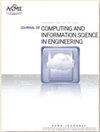基于归一化Google距离和语义相似度度量方法的供应商能力评分文本分析框架
IF 2.6
3区 工程技术
Q2 COMPUTER SCIENCE, INTERDISCIPLINARY APPLICATIONS
Journal of Computing and Information Science in Engineering
Pub Date : 2023-03-21
DOI:10.1115/1.4062173
引用次数: 0
摘要
制造供应商和承包商网站上的非结构化数据可以为他们的技术和组织能力提供有价值的见解。然而,由于能力数据通常使用自然语言文本以非结构化和非正式的方式表示,因此不容易有效地搜索和分析能力数据并从中学习。这项工作的目标是提出一个框架,在供应商搜索和发现用例的上下文中,基于供应商的在线能力描述,实现对供应商的自动分类和排名。本工作中使用的建议文本分析方法由使用SKOS(简单知识组织系统)的正式同义词库支持,该系统提供词汇和结构语义。规范化谷歌距离(NGD)作为度量标准,用于根据供应商与所查询功能的相似度对供应商进行排序时测量术语的相关性。采用假设的供应商搜索场景对所提出的框架进行了实验验证。结果表明,生成的排名列表与人类的判断高度相关,特别是当搜索空间被划分为具有不同能力的多类供应商时。然而,当多个重叠的供应商类别合并在一起形成异质搜索空间时,相关性降低。所提出的框架可以通过提高其底层搜索引擎的精确性、可靠性和智能性来支持供应商筛选和发现解决方案。本文章由计算机程序翻译,如有差异,请以英文原文为准。
A Text Analytics Framework for Supplier Capability Scoring Supported by Normalized Google Distance and Semantic Similarity Measurement Methods
The unstructured data available on the websites of manufacturing suppliers and contractors can provide valuable insights into their technological and organizational capabilities. However, since the capability data are often represented in an unstructured and informal fashion using natural language text, it is not easy to efficiently search and analyze the capability data and learn from it. The objective of this work is to propose framework to enable automated classification and ranking of suppliers based on their online capability descriptions in the context of a supplier search and discovery use case. The proposed text analytics methods used in this work are supported by a formal thesaurus that uses SKOS (Simple Knowledge Organization System) that provides lexical and structural semantics. Normalized Google Distance (NGD) is used as the metric for measuring the relatedness of terms when ranking suppliers based on their similarities with the queried capabilities. The proposed framework is validated experimentally using a hypothetical supplier search scenario. The results indicate that the generated ranked list is highly correlated with human judgment, especially when the search space is partitioned into multiple classes of suppliers with distinct capabilities. However, the correlation decreases when multiple overlapping classes of suppliers are merged together to form a heterogenous search space. The proposed framework can support supplier screening and discovery solutions by improving the precision, reliability, and intelligence of their underlying search engines.
求助全文
通过发布文献求助,成功后即可免费获取论文全文。
去求助
来源期刊
CiteScore
6.30
自引率
12.90%
发文量
100
审稿时长
6 months
期刊介绍:
The ASME Journal of Computing and Information Science in Engineering (JCISE) publishes articles related to Algorithms, Computational Methods, Computing Infrastructure, Computer-Interpretable Representations, Human-Computer Interfaces, Information Science, and/or System Architectures that aim to improve some aspect of product and system lifecycle (e.g., design, manufacturing, operation, maintenance, disposal, recycling etc.). Applications considered in JCISE manuscripts should be relevant to the mechanical engineering discipline. Papers can be focused on fundamental research leading to new methods, or adaptation of existing methods for new applications.
Scope: Advanced Computing Infrastructure; Artificial Intelligence; Big Data and Analytics; Collaborative Design; Computer Aided Design; Computer Aided Engineering; Computer Aided Manufacturing; Computational Foundations for Additive Manufacturing; Computational Foundations for Engineering Optimization; Computational Geometry; Computational Metrology; Computational Synthesis; Conceptual Design; Cybermanufacturing; Cyber Physical Security for Factories; Cyber Physical System Design and Operation; Data-Driven Engineering Applications; Engineering Informatics; Geometric Reasoning; GPU Computing for Design and Manufacturing; Human Computer Interfaces/Interactions; Industrial Internet of Things; Knowledge Engineering; Information Management; Inverse Methods for Engineering Applications; Machine Learning for Engineering Applications; Manufacturing Planning; Manufacturing Automation; Model-based Systems Engineering; Multiphysics Modeling and Simulation; Multiscale Modeling and Simulation; Multidisciplinary Optimization; Physics-Based Simulations; Process Modeling for Engineering Applications; Qualification, Verification and Validation of Computational Models; Symbolic Computing for Engineering Applications; Tolerance Modeling; Topology and Shape Optimization; Virtual and Augmented Reality Environments; Virtual Prototyping

 求助内容:
求助内容: 应助结果提醒方式:
应助结果提醒方式:


